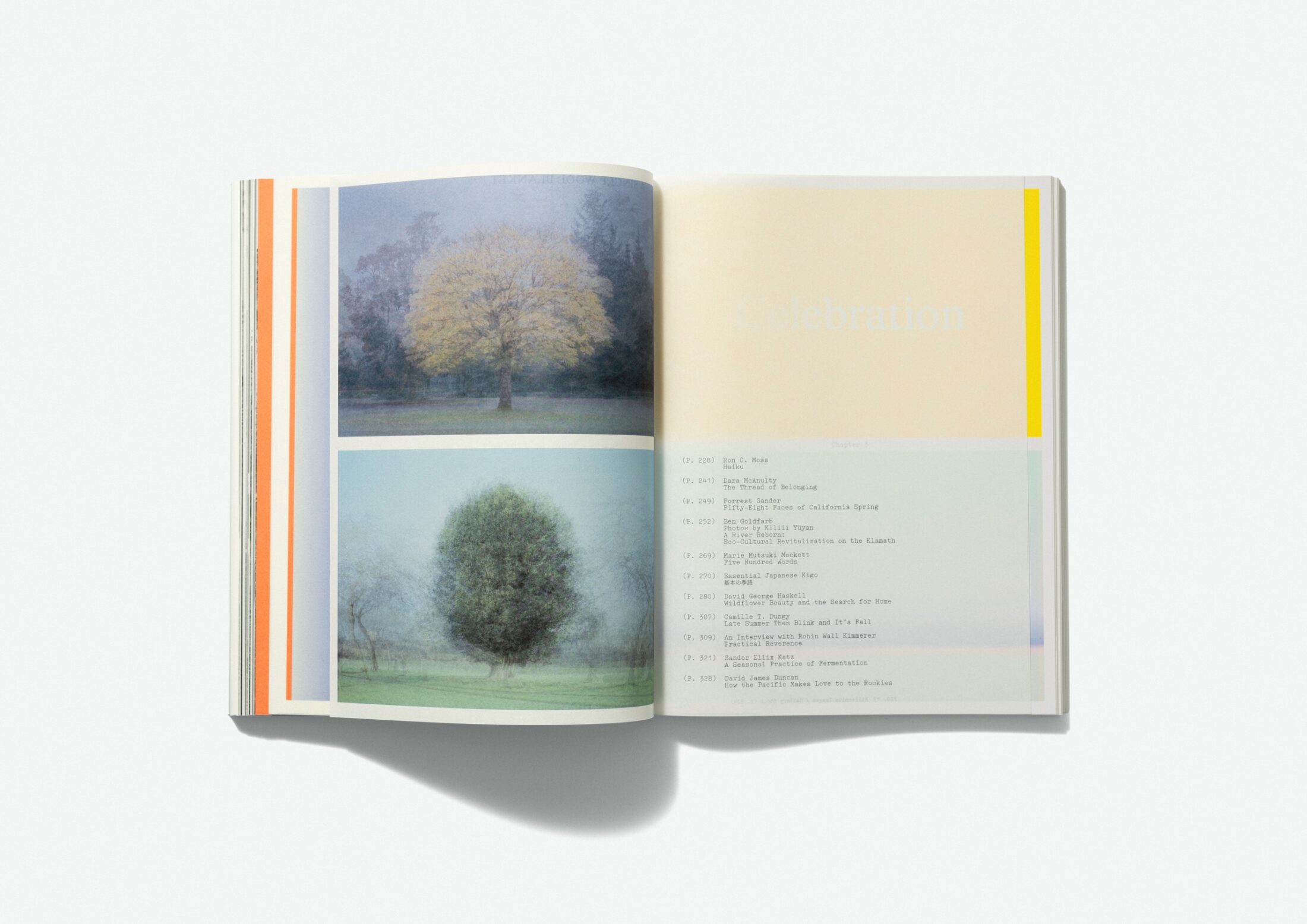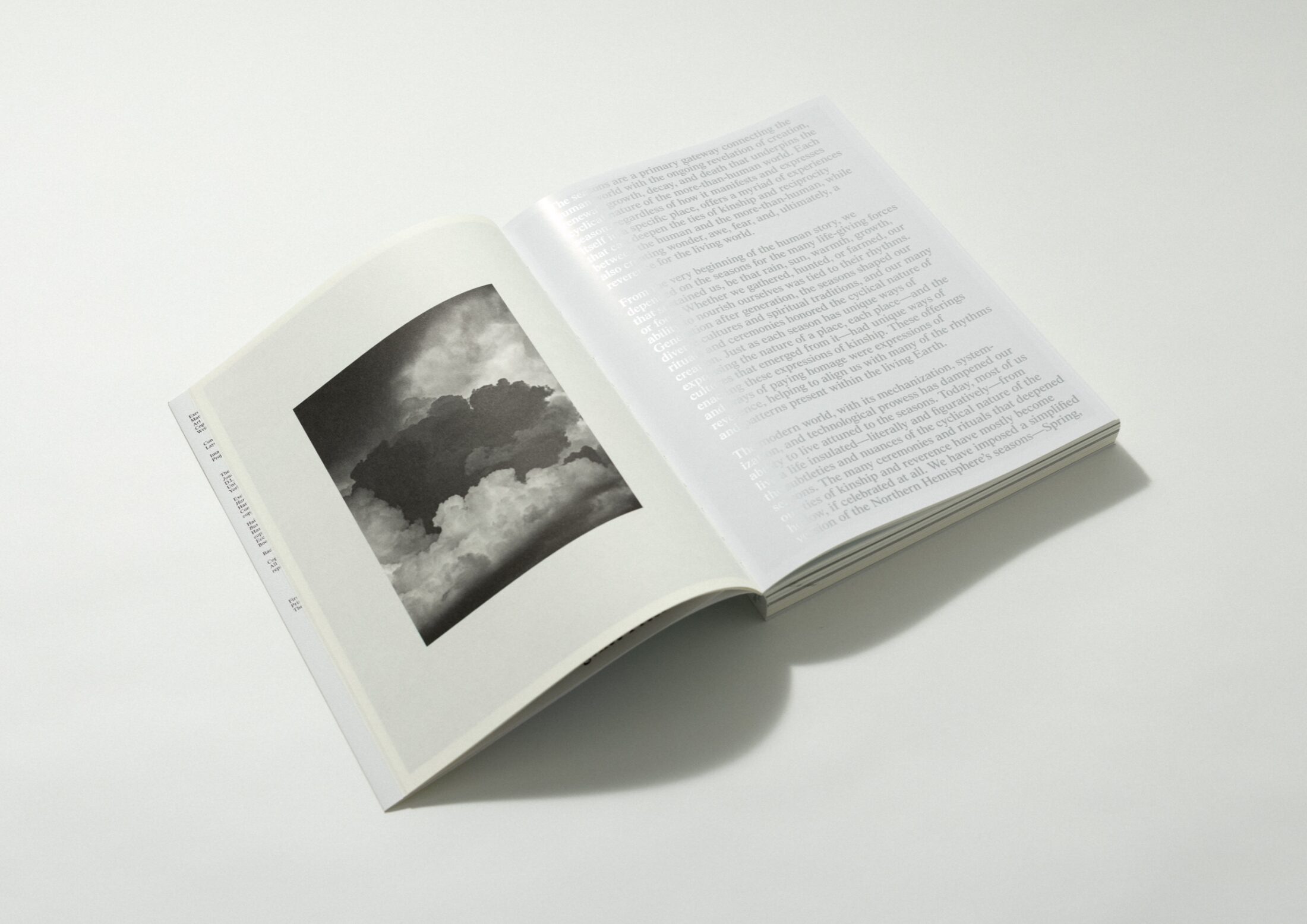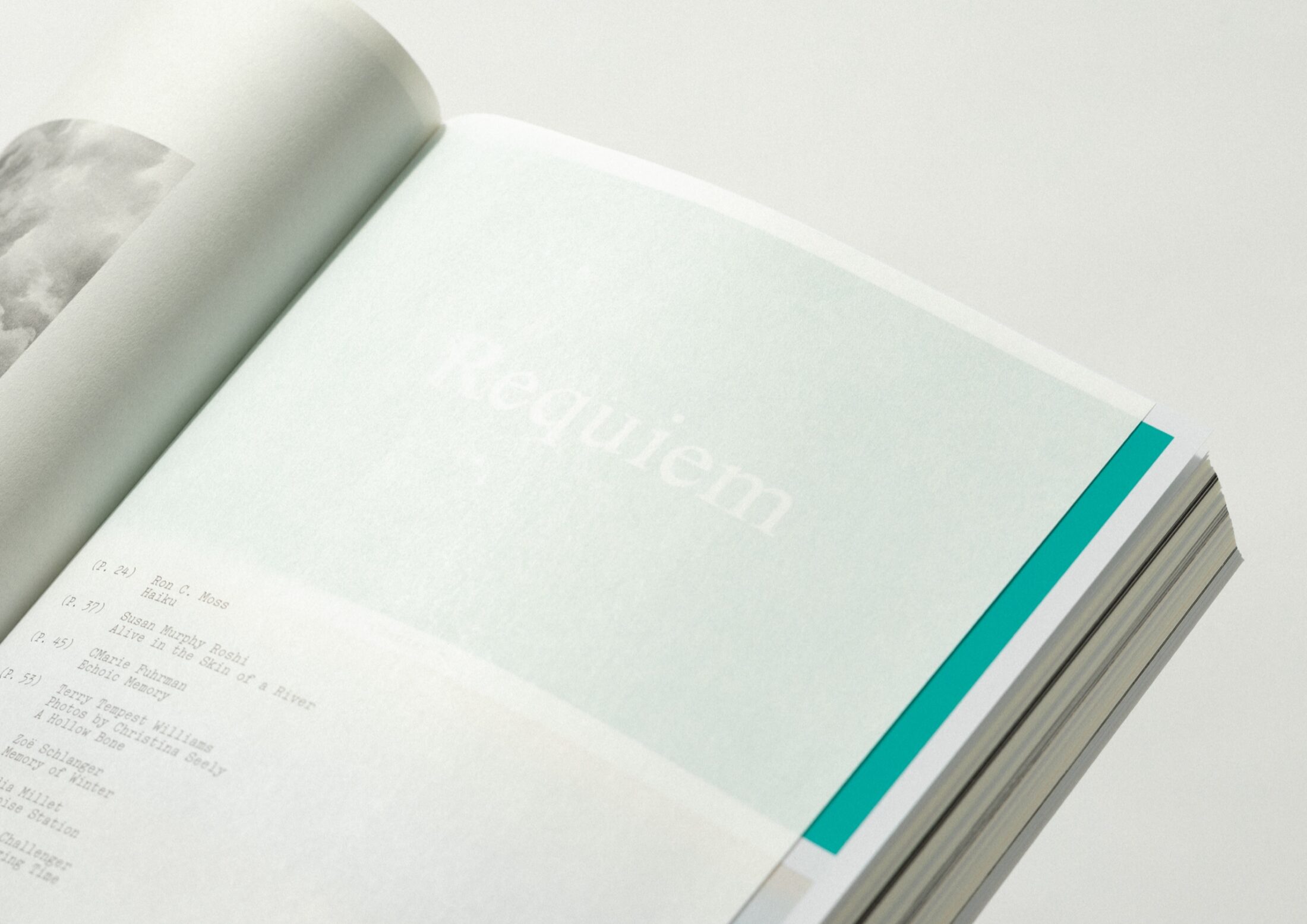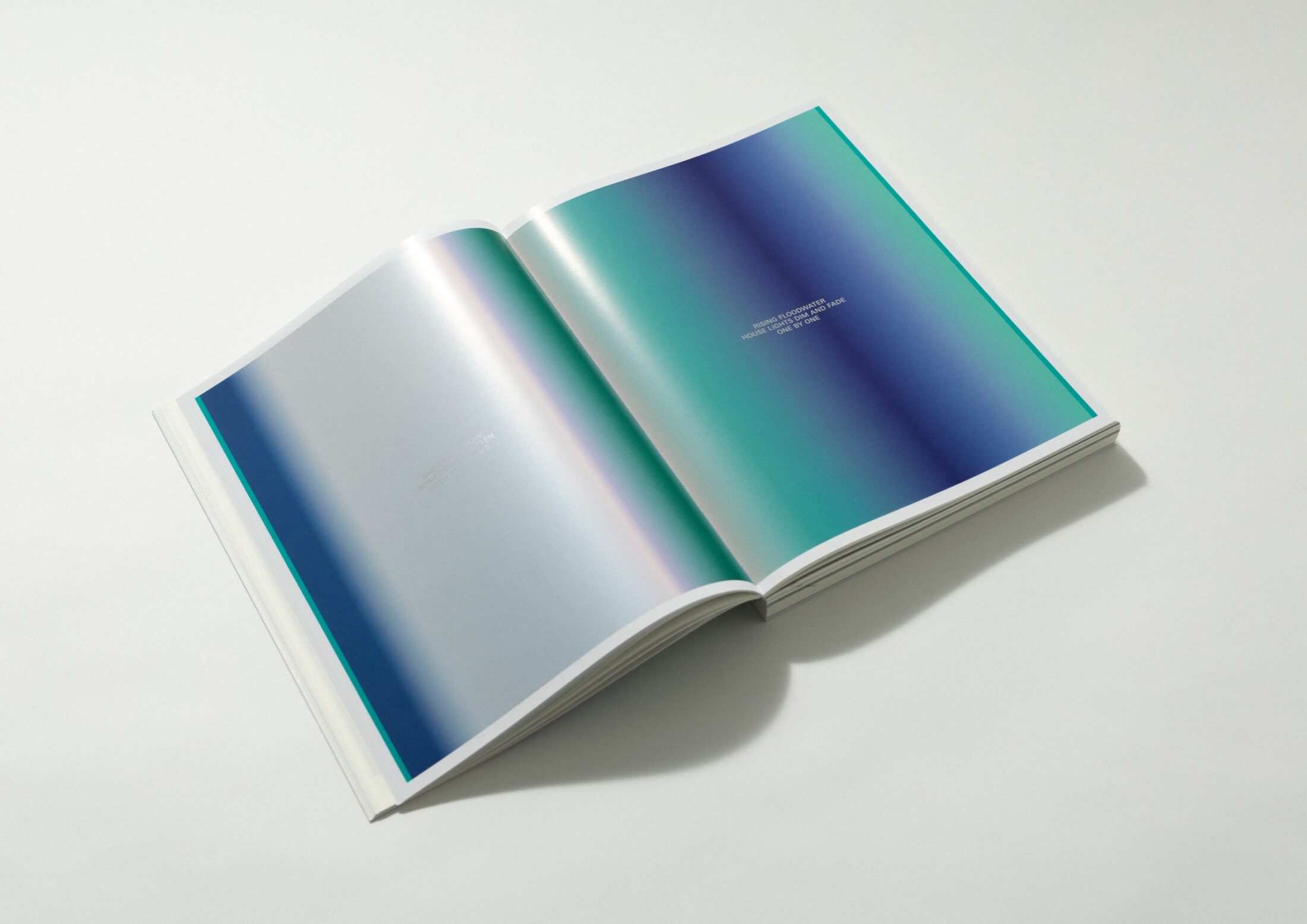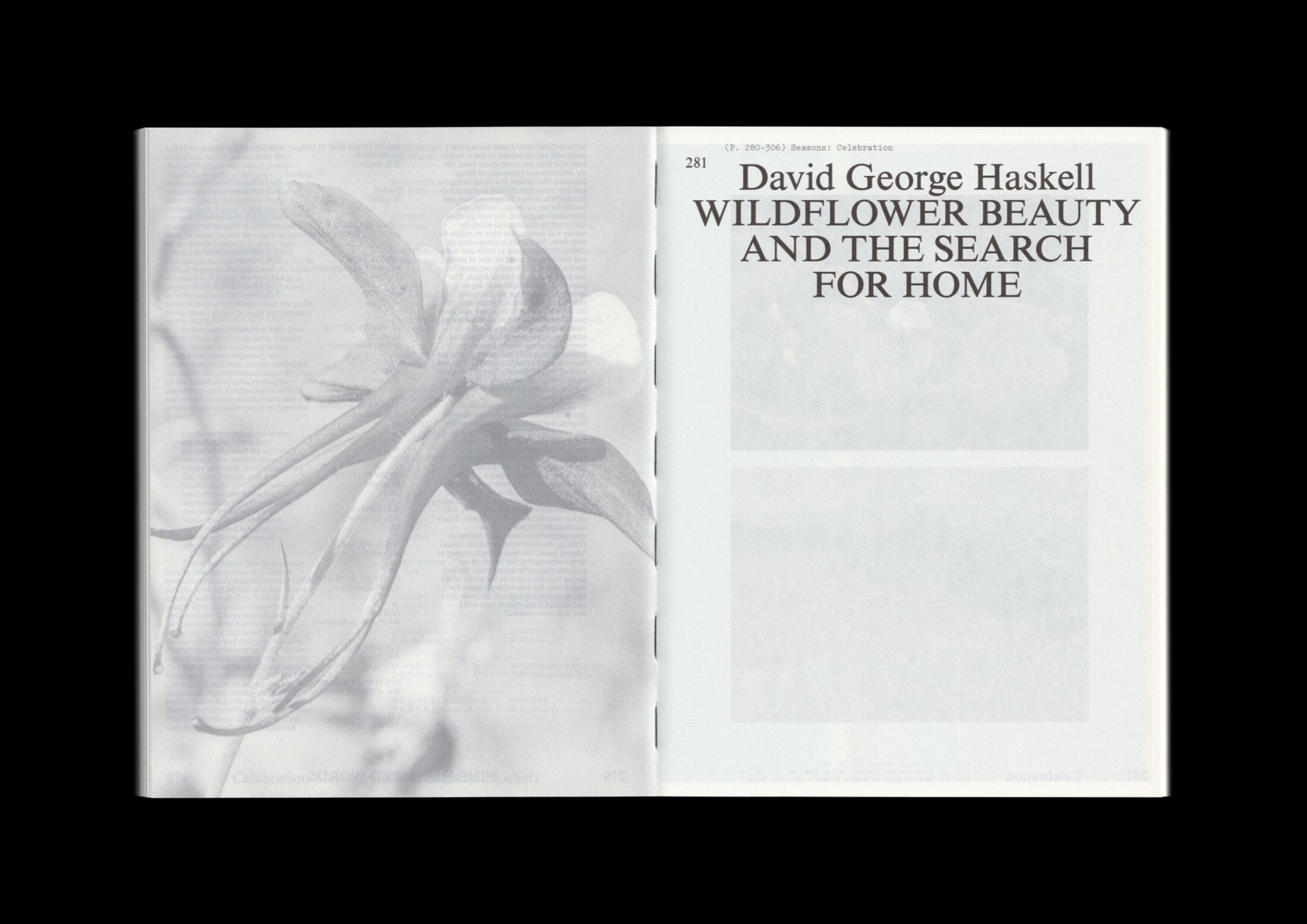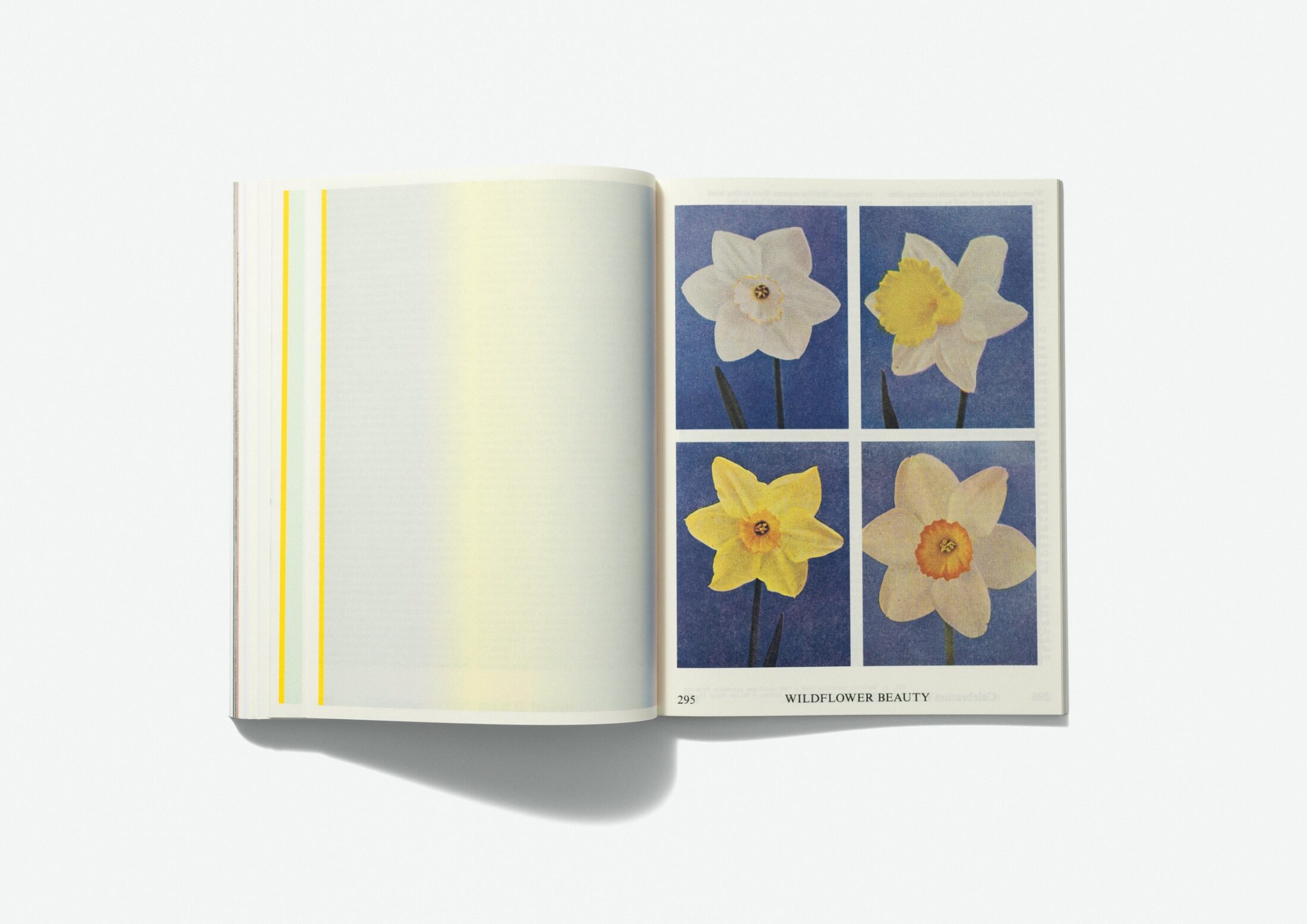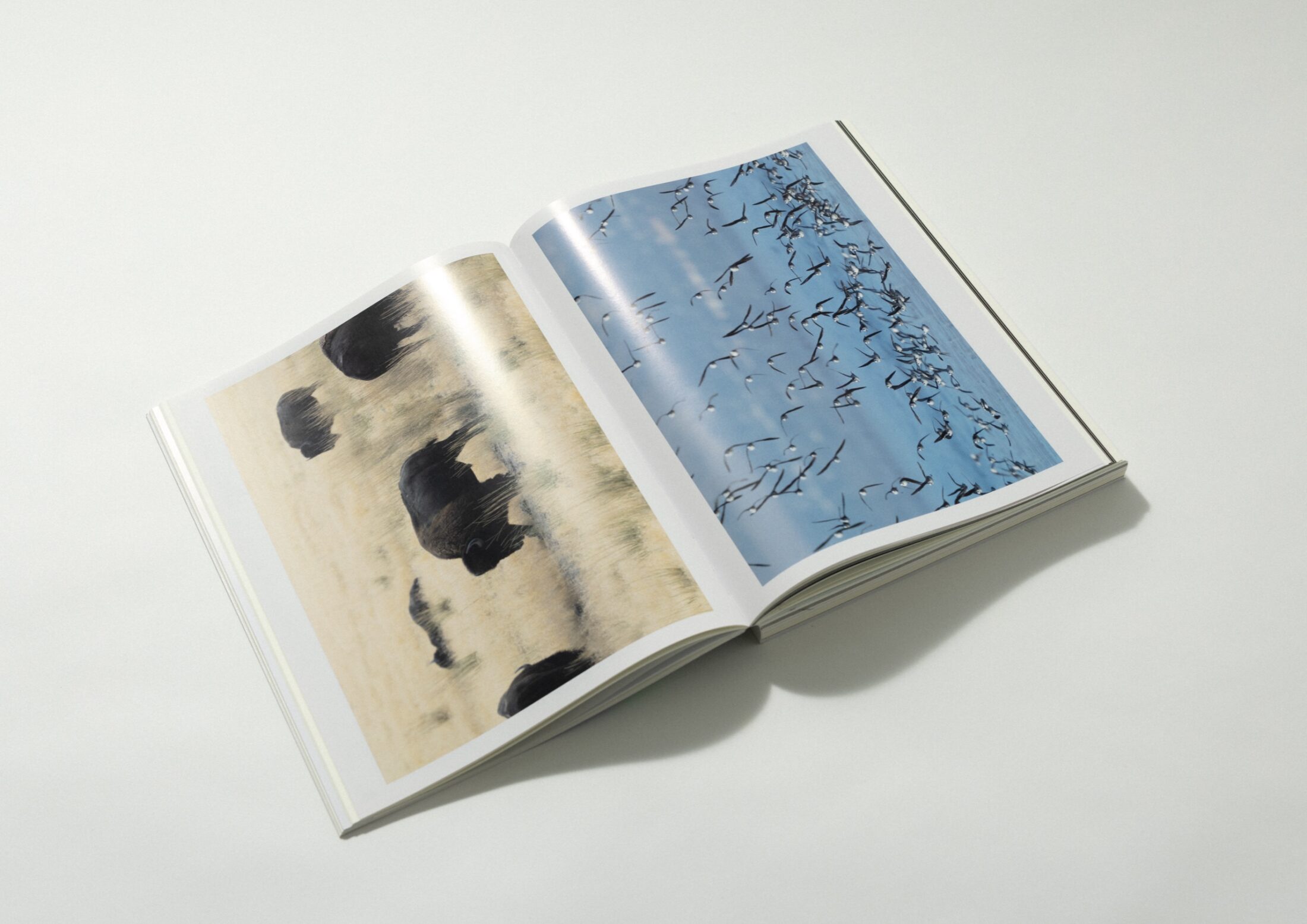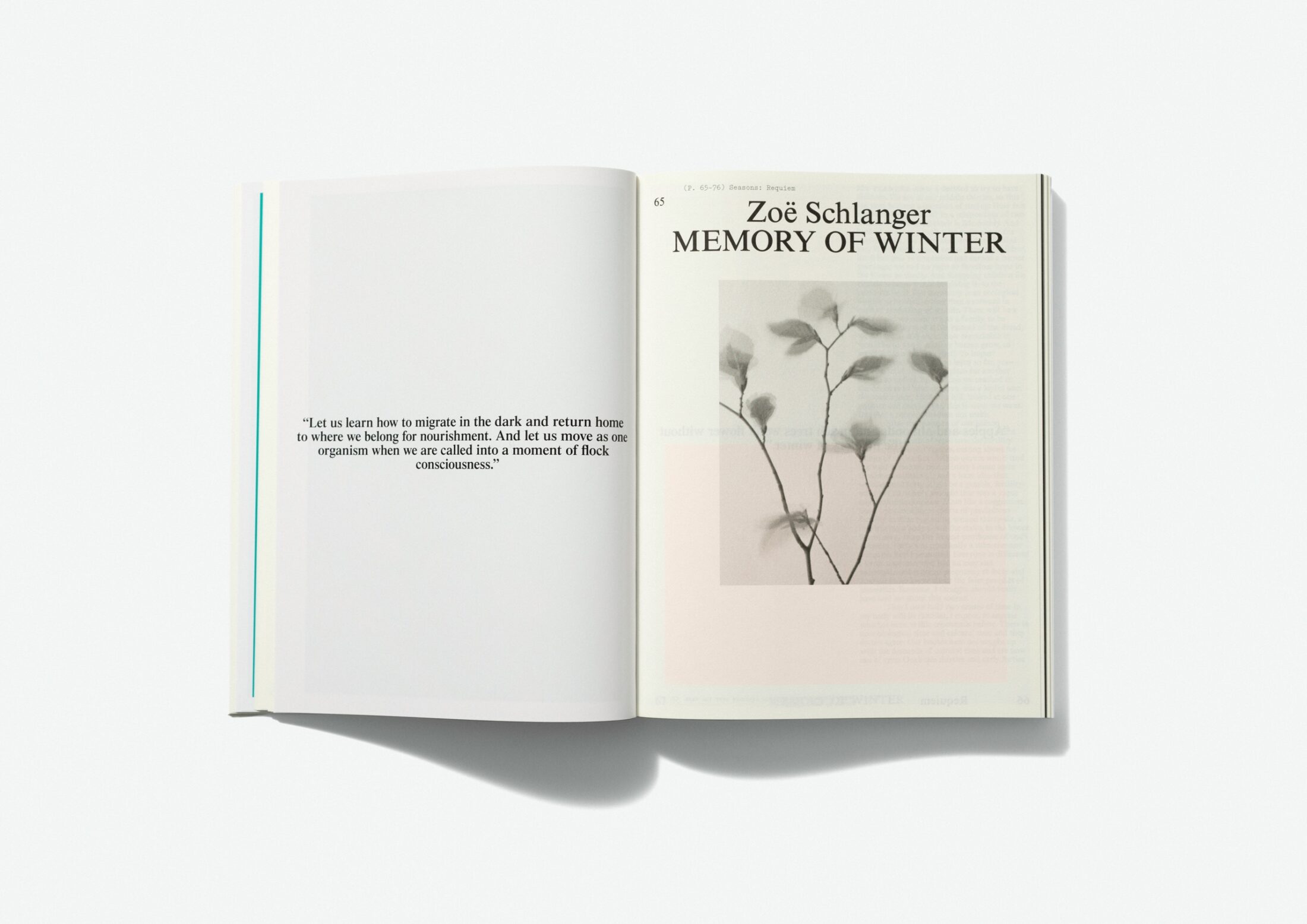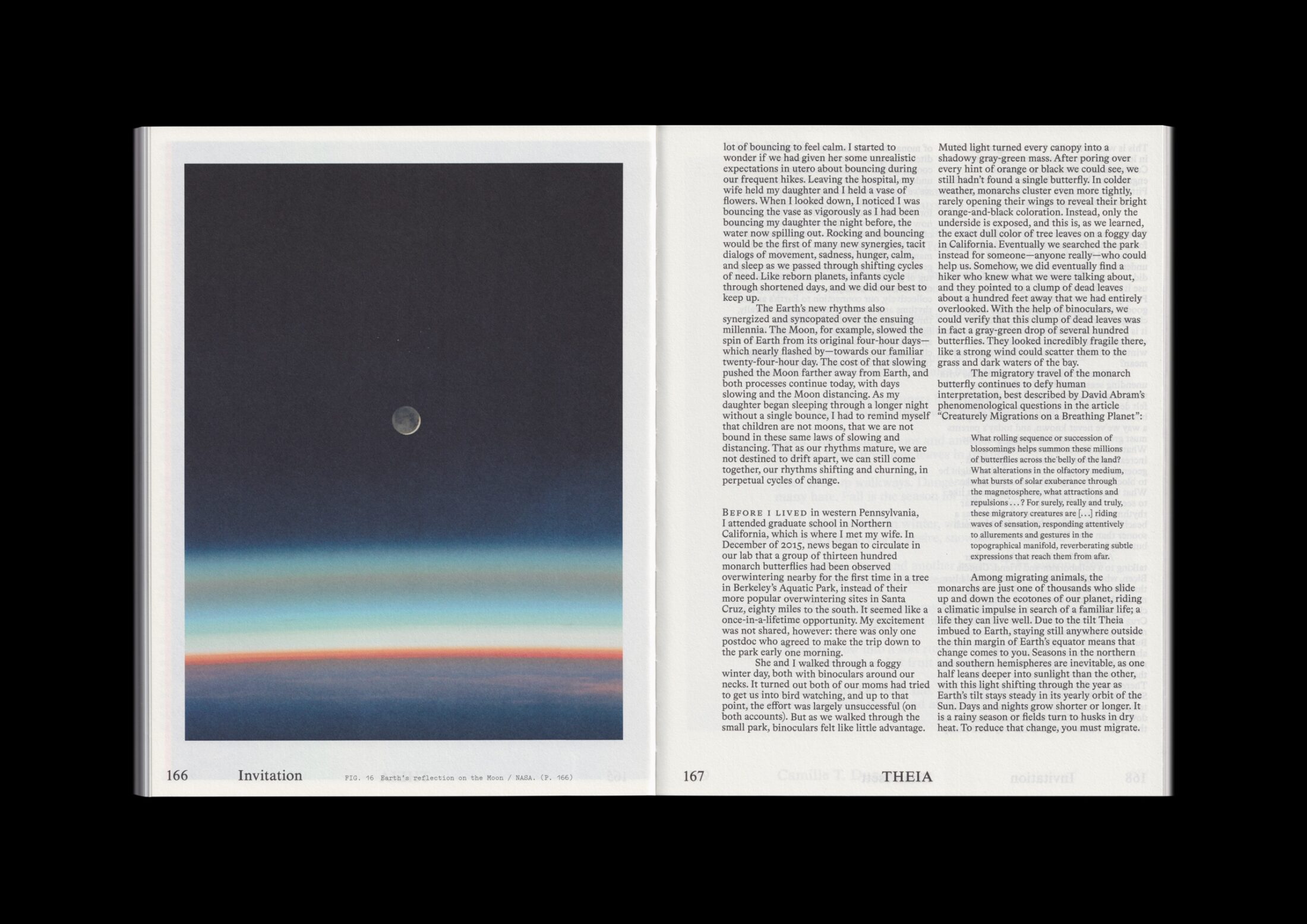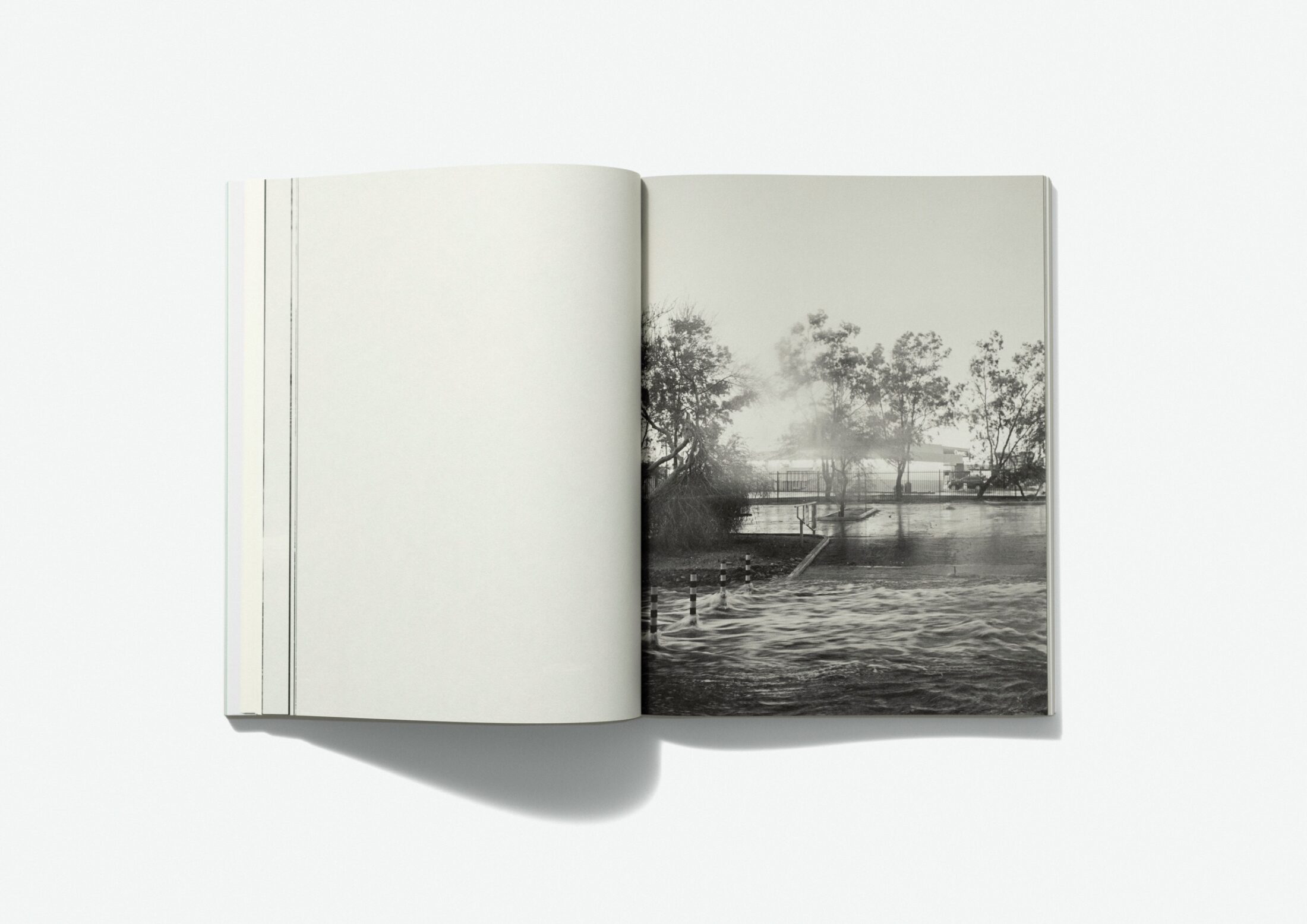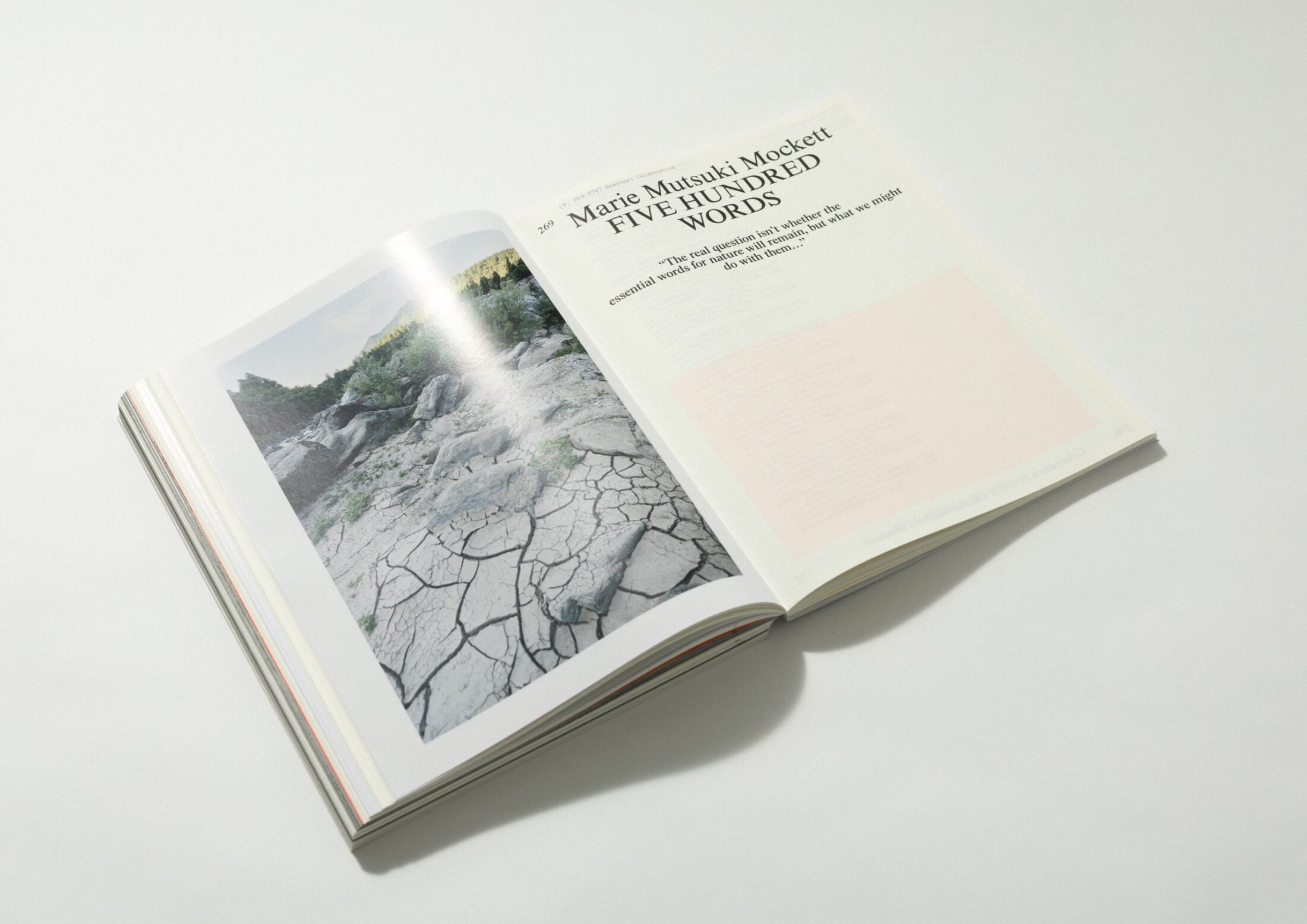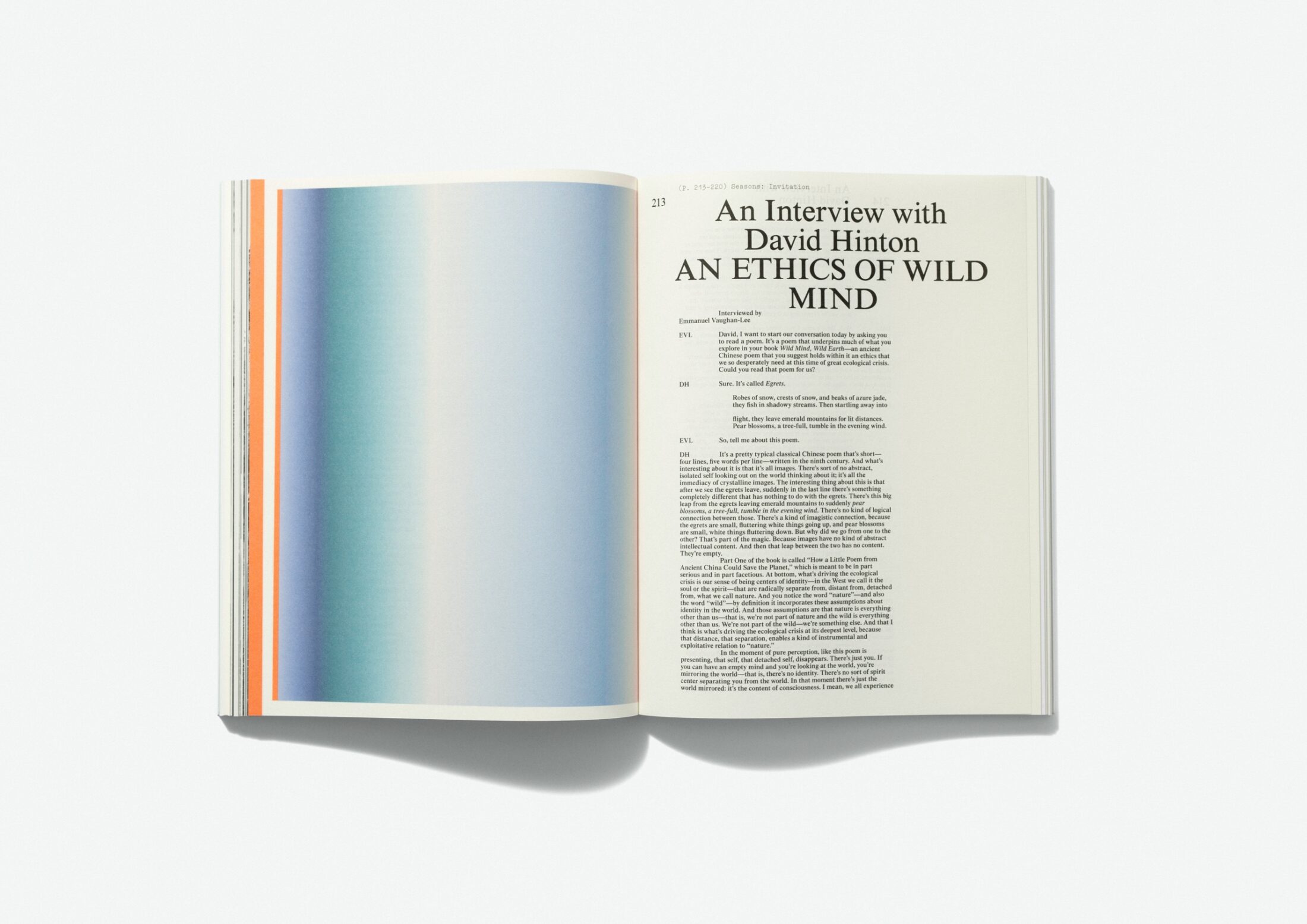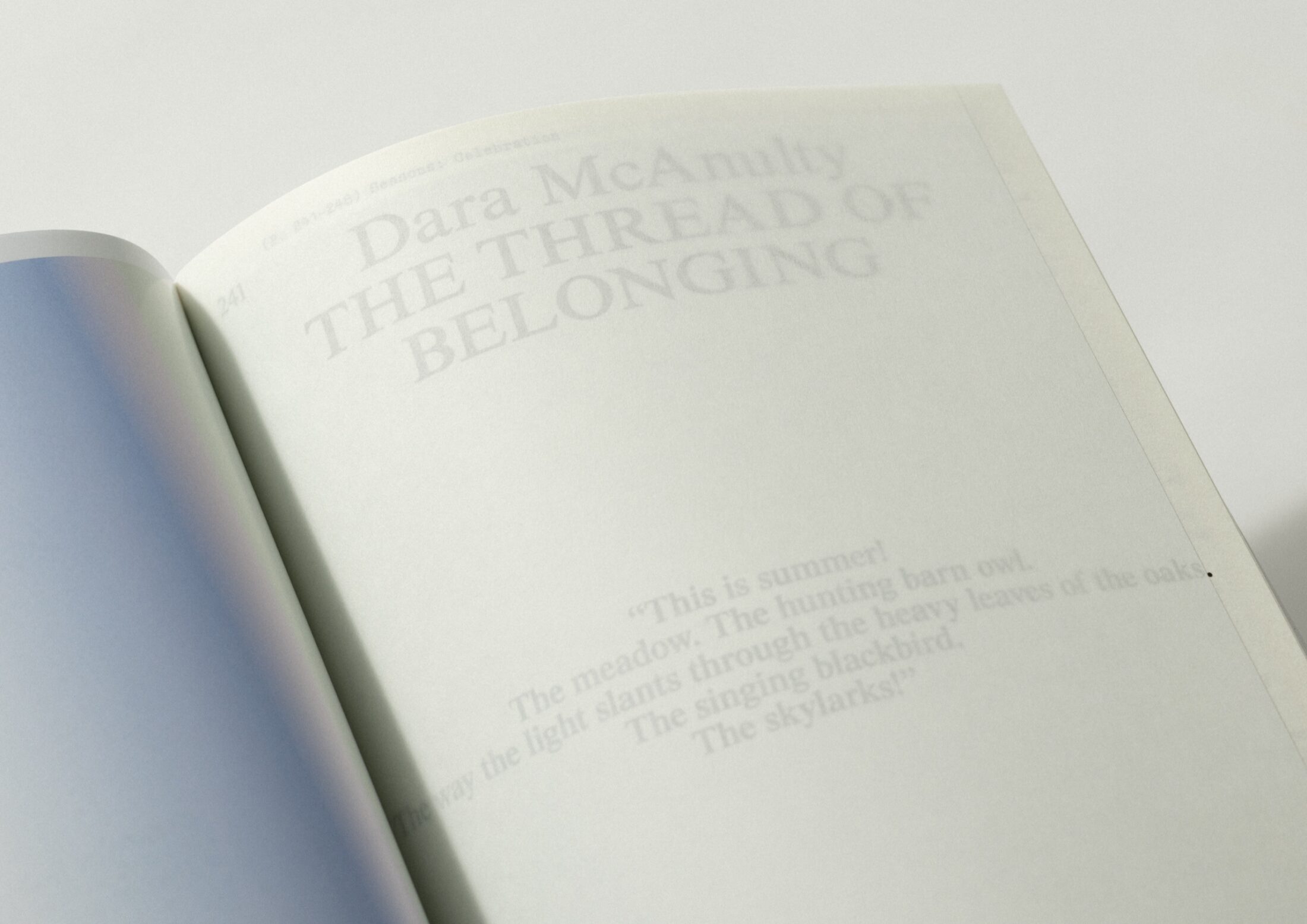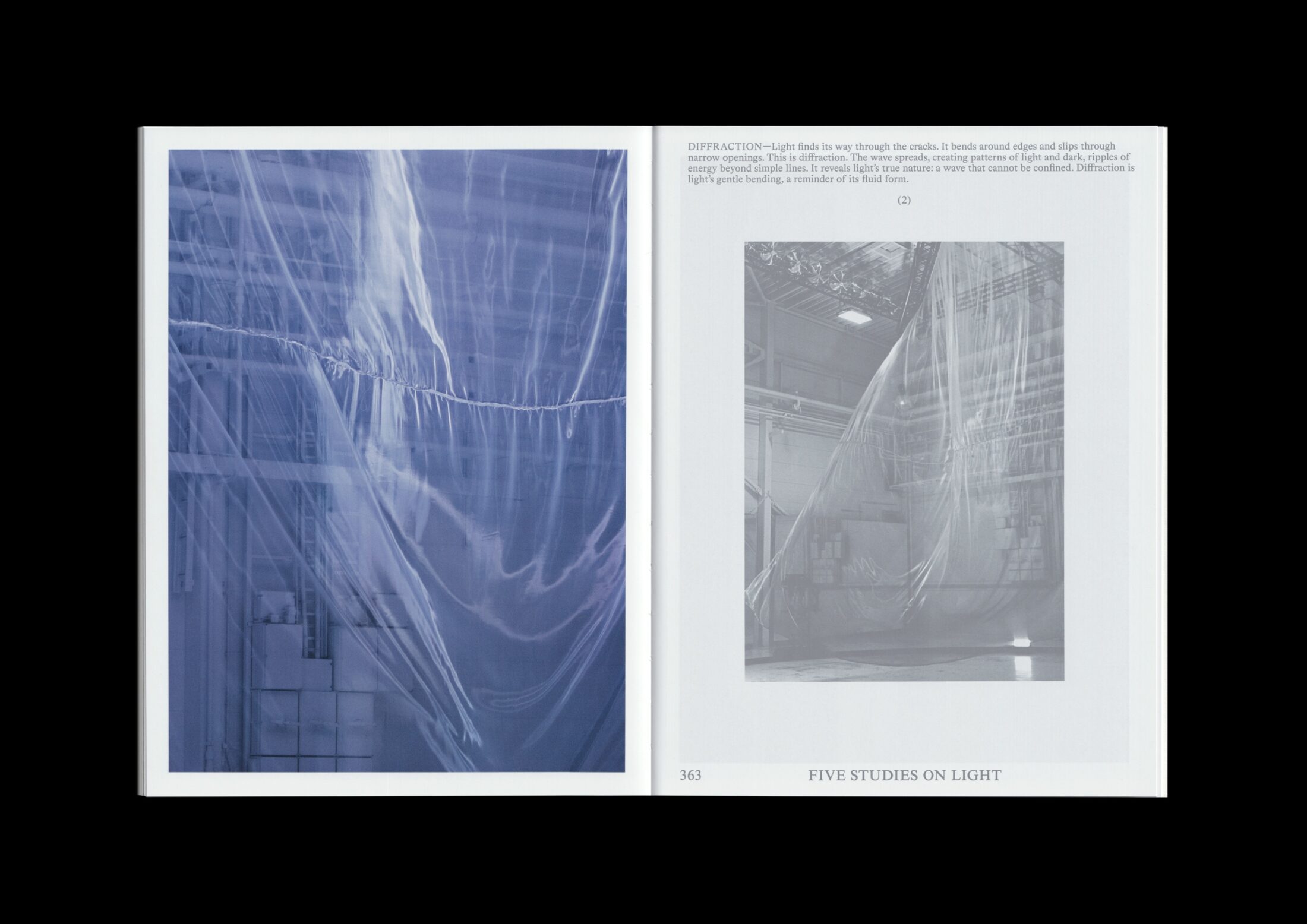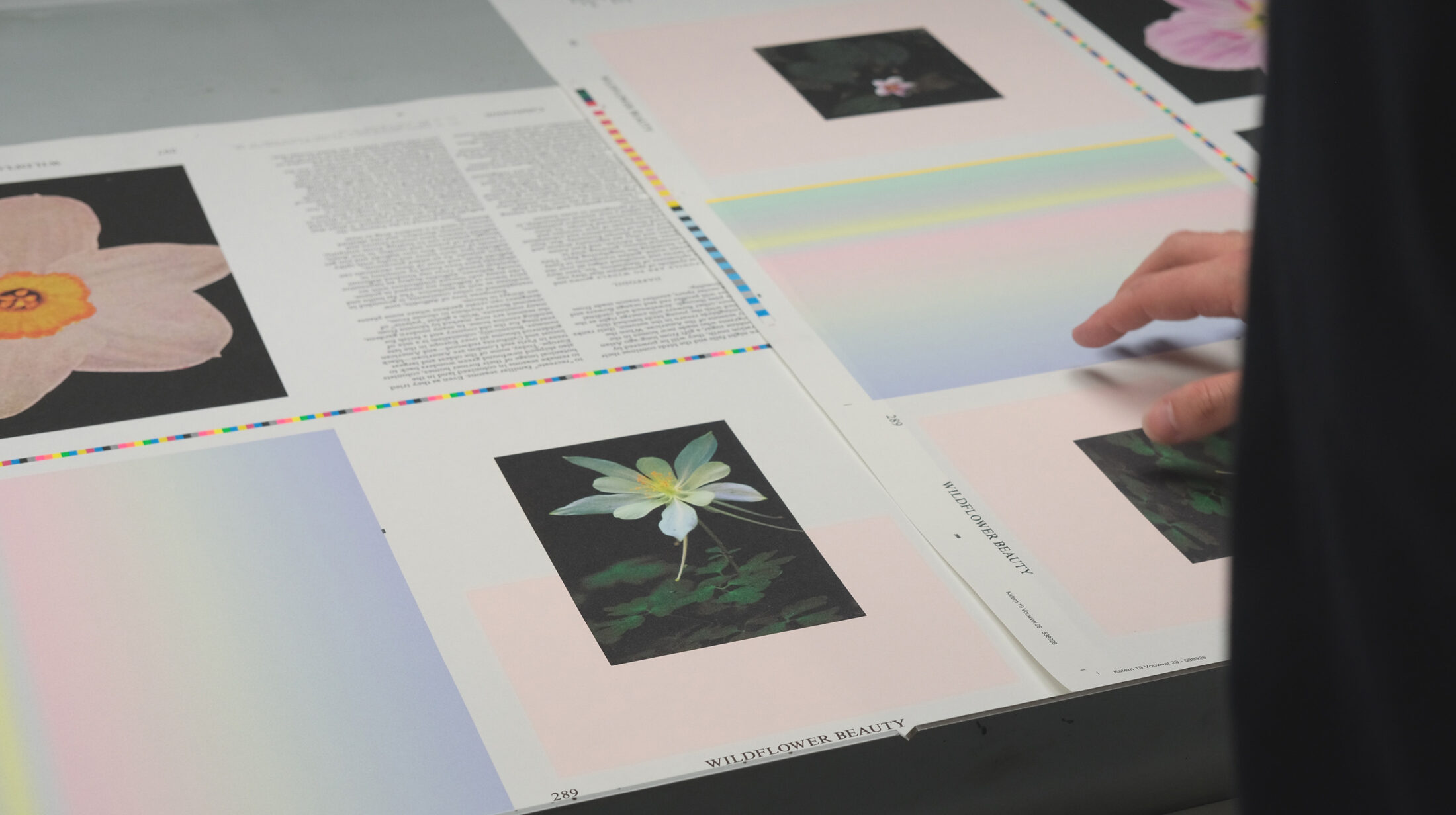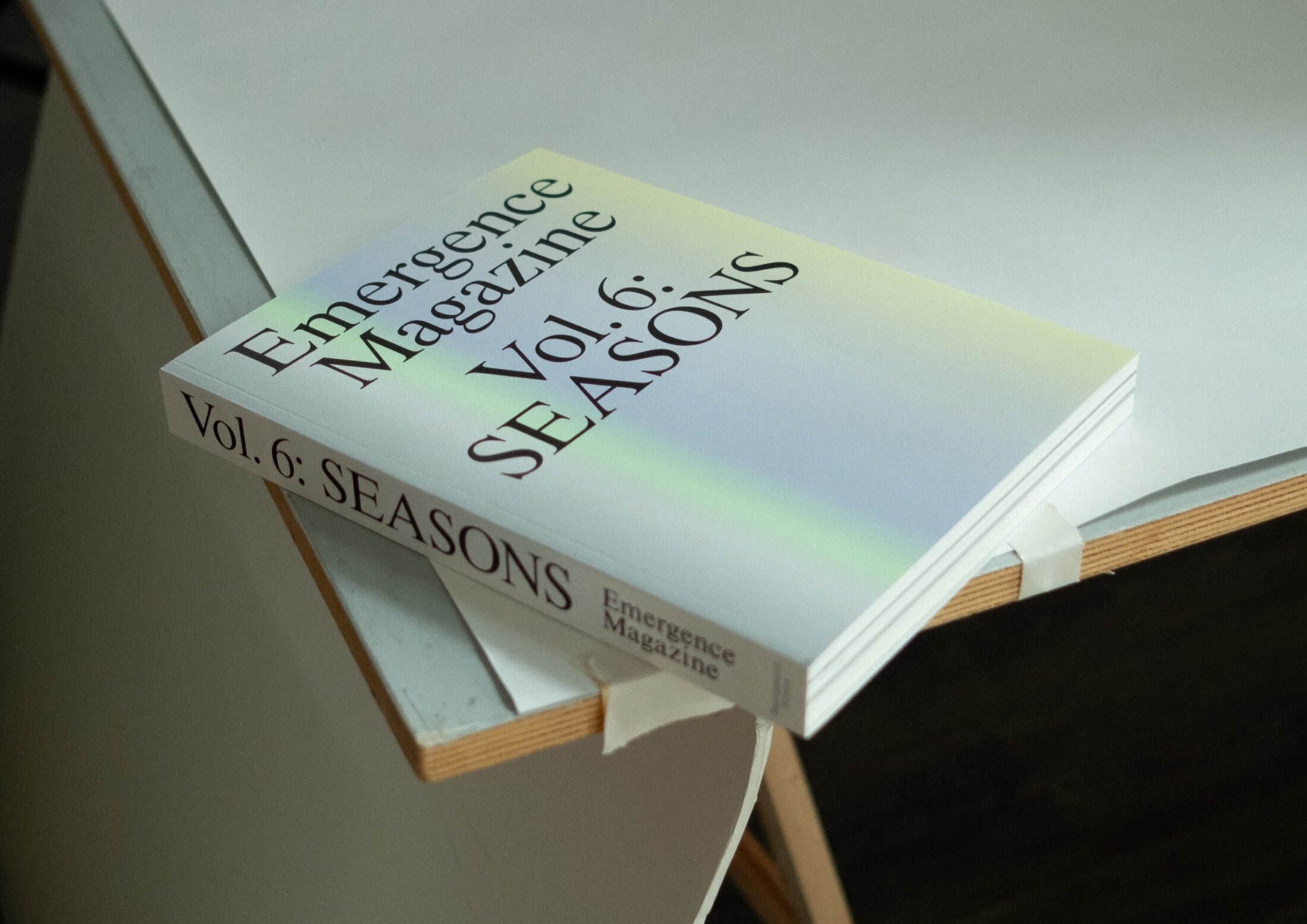
Emergence Magazine Vol. 6
Like light passing through a prism to reveal its many colors, the myriad expressions of the Earth unfold through the seasons. We’ve long moved with their simple and sacred rhythm; they are the primary gateway through which the human engages with cycles of creation, destruction, and renewal. But today we estrange ourselves from the seasons with technology and human-centric myths, while an unraveling climate causes them to grow increasingly unfamiliar. Reflecting a world where snow no longer arrives, annual migrations fall out of time, yet first blossoms still burst, Seasons, our sixth print edition, moves through three themes: requiem, invitation, and celebration—each a contemplation on the paradoxical ways the seasons now beckon us into intimate relationship.
This collection of haiku, essays, short fiction, photography, conversations, and poetry, infused with a spectrum of color and light, listens for the turning song of the seasons—for what vanishes and what remains—attentive to these moments that call us into communion with the Earth.
The entities were all colored windows
upon which fell the rays of Being’s Sun.
In every window—red, yellow, blue—
the Light appeared in the window’s color.
–Jami
The contributors to Seasons have been distinguished with numerous awards, including the Pulitzer Prize, the Pushcart Prize, a Lifetime Achievement Award from the American Academy of Arts and Letters, the American Book Award, the National Poetry Series Award, a British Book Award for Narrative Non-Fiction, an American Academy of Arts and Letters Literature Award, the PEN/E.O. Wilson Literary Science Writing Award, the James Beard Award, the Wainwright Prize for Nature Writing, the California Book Award, the Whiting Award, the Gertrude Stein Award, the Iris Book Award, the John Burroughs Medal, the Poetry Center Book Award, the Butler Literary Award, the National Geographic Eliza Scidmore Award for Outstanding Storytelling, a National Association of Science Writers reporting award, fellowships from the MacArthur Foundation, Guggenheim Foundation, Lannan Foundation, Rockefeller Foundation, National Endowment for the Arts, and the Smithsonian Institution.
-
Boris AcketBoris Acket
Boris Acket is a Dutch contemporary artist and composer, who creates collective spaces with light, sound, and motion that explore the interplay between control and surrender in the (natural) world. His works and performances have been presented internationally, and he has collaborated with numerous artists and collectives, including Berlin-based architecture studio Sub, Dutch designer Sabine Marcelis, Dutch composer Joep Beving, and acoustic ecologist Gordon Hempton.
-
Melanie ChallengerMelanie Challenger
Melanie Challenger researches and writes on environmental history, bioethics, and philosophy of science. Her books include How to Be Animal: What It Means to Be Human; Animal Dignity: Philosophical Reflections on Nonhuman Existence; and On Extinction: How We Became Estranged from Nature, which received Santa Barbara Library’s Green Award for environmental writing. She has written for several publications, including New Scientist, The Guardian, Aeon, Nautilus, and BBC Science Focus, and has participated in documentaries and film for the BBC, CBC, Arte, and ZDF. Melanie serves as deputy chair of the Nuffield Council on Bioethics and a vice president of the RSPCA. She was part of a team who drafted the first Declaration on Animal Dignity in 2024 and is a founding member of Animals in the Room, a project that seeks to expand democratic imaginations to explore how animals can be present, participate, and be represented in the decisions that affect them. In 2025, she became a National Geographic Explorer.
-
David James DuncanDavid James Duncan
David James Duncan is author of the award-winning novels The River Why and The Brothers K, and most recently, Sun House; the nonfiction collection My Story as Told by Water, which was a finalist for the National Book Award; the best-selling collection of “churchless sermons” God Laughs and Plays; and the story collection River Teeth. His recognitions include three Pacific Northwest Booksellers Awards, two Pushcart Prizes, a Lannan Fellowship, and the American Library Association’s 2004 Award for the Preservation of Intellectual Freedom (with co-author Wendell Berry). David lives on a charming little trout stream in Missoula, Montana, in accord with his late friend Jim Harrison’s advice to finish his life disguised as a creek.
-
Camille T. DungyCamille T. Dungy
Camille T. Dungy is the author of four collections of poetry: Trophic Cascade, Smith Blue, Suck on the Marrow, and What to Eat, What to Drink, What to Leave for Poison. Her debut collection of personal essays is Guidebook to Relative Strangers. Camille edited Black Nature: Four Centuries of African American Nature Poetry. Her honors include an American Book Award, two Northern California Book Awards, two NAACP Image Award nominations, a California Book Award silver medal, and she was awarded a Guggenheim Fellowship in 2019. She is a distinguished professor in the English Department at Colorado State University and the poetry editor at Orion Magazine.
-
CMarie FuhrmanCMarie Fuhrman
CMarie Fuhrman is an author and poet, whose work is rooted in the landscape of the West. She is the author of the essay collection Salmon Weather: Writing from the Land of No Return and Camped Beneath the Dam: Poems; and the co-editor of Cascadia Field Guide: Art, Ecology, and Poetry and Native Voices: Indigenous Poetry, Conversation, and Craft. She has published poetry and nonfiction in several journals, including Terrain.org, Alta Magazine, Big Sky Journal, and Poetry Northwest; and is the host of Colorado Public Radio’s Terra Firma, and an award-winning columnist for the Inlander. At Western Colorado University, CMarie serves as Associate Director for the graduate program in creative writing. She resides in the Salmon River Mountains of Idaho.
-
Forrest GanderForrest Gander
Forrest Gander is a writer and translator with degrees in geology and literature whose work often focuses on human and ecological intimacies. He won the Pulitzer Prize for Poetry in 2019 for his poetry collection Be With. His other books include Redstart: An Ecological Poetics; Science & Steepleflower; Core Samples from the World, which was a finalist for the Pulitzer Prize and the National Book Critics Circle Award; and most recently, Mojave Ghost: A Novel-Poem. He is a United States Artists Rockefeller Fellow and has received fellowships from The National Endowment for the Arts and the Guggenheim, Whiting, and Howard Foundations. In 2011, he was awarded the Library of Congress Witter Bynner Fellowship.
-
Ben GoldfarbBen Goldfarb
Ben Goldfarb is an environmental journalist and author of Crossings: How Road Ecology Is Shaping the Future of Our Planet, a New York Times Best Book of the Year; and Eager: The Surprising, Secret Life of Beavers and Why They Matter, winner of the PEN/E.O. Wilson Literary Science Writing Award. His writing has appeared in The Atlantic, The New Yorker, Smithsonian Magazine, Science, The New York Times, National Geographic, Orion, and many other publications; and has been anthologized in The Best American Science & Nature Writing and Cosmic Outlaws: Coming of Age at the End of Nature.
-
Bear GuerraBear Guerra
Bear Guerra is a photographer whose work explores the human impact of globalization, development, and social and environmental justice issues, often in communities typically underrepresented in the media. His work has appeared in The New York Times, The Wall Street Journal, The Atlantic, Le Monde, BBC, and NPR, and has been exhibited widely. He was a finalist for a National Magazine Award in Photojournalism. Bear and his wife, Ruxandra Guidi, work together under the name Fonografia Collective to produce local and international print, radio, and multimedia stories about human rights and social justice. Bear is also a board member and producer with the award-winning nonprofit journalism collaborative, Homelands Productions, and is the visuals editor at High Country News.
-
David G. HaskellDavid G. Haskell
David George Haskell is a biologist and professor of biology and environmental studies at the University of the South in Sewanee, Tennessee. His books include The Songs of Trees: Stories from Nature’s Great Connectors, winner of the 2020 Iris Book Award and the 2018 John Burroughs Medal; The Forest Unseen: A Year’s Watch in Nature, winner of the National Academies’ Best Book Award for 2013, finalist for the 2013 Pulitzer Prize in nonfiction, winner of the 2013 Reed Environmental Writing Award, and winner of the 2012 National Outdoor Book Award for Natural History Literature; Sounds Wild and Broken: Sonic Marvels, Evolution’s Creativity, and the Crisis of Sensory Extinction, a finalist for the Pulitzer Prize; and the forthcoming book How Flowers Made Our World.
-
David HintonDavid Hinton
David Hinton has published numerous books of poetry and essays, and many translations of ancient Chinese poetry and philosophy, all informed by an abiding interest in deep ecological thinking. He is the first person in over a century to translate into English all four of the Chinese philosophical masterworks—Tao Te Ching, Analects of Confucius, Mencius, and Chuang Tzu. His translations have earned him the Guggenheim Fellowship, the Landon Translation Award, and the PEN American Translation Award. David recently received a lifetime achievement award from the American Academy of Arts and Letters. His most recent book is Wild Mind, Wild Earth. “Breath-Space and Seed-Time” is part of a forthcoming book entitled Orient.
-
Jane HirshfieldJane Hirshfield
Jane Hirshfield is a poet, essayist, and translator whose poetry collections include Given Sugar, Given Salt, a finalist for the National Book Critics Circle Award; After, which was shortlisted for the T.S. Eliot Prize and named “best book of 2006” by The Washington Post and others; The Beauty, Ledger, and most recently, The Asking. Recognitions include Columbia University’s Translation Center Award, the Poetry Center Book Award, the California Book Award, and the Hall-Kenyon Prize in American Poetry, and fellowships from the Guggenheim and Rockefeller Foundations, the National Endowment for the Arts, and the Academy of American Poets. In 2004, Jane was awarded the 70th Academy Fellowship for distinguished poetic achievement by The Academy of American Poets. And in 2019, she was elected into the American Academy of Arts and Sciences.
-
Brian IsettBrian Isett
Brian Isett is a Pittsburgh-based biologist and writer, whose work includes the poetry collection Grid Poems and his latest book, The Forgotten Teachers, created in collaboration with artist Claudia Biçen. His recognitions include National Science Foundation and National Research Service Award fellowships for his scientific work, and the Arthur Lynn Andrews Prize and George Harmon Coxe Award for his short fiction.
-
Sandor KatzSandor Katz
Sandor Ellix Katz is a self-taught experimentalist who lives in rural Tennessee. He is the author of Wild Fermentation and The Art of Fermentation, winner of the James Beard Award and a finalist at the International Association of Culinary Professionals. Sandor is the recipient of the Craig Clairborne Lifetime Achievement Award from the Southern Foodways Alliance. He and his work have appeared on NPR’s “Fresh Air with Terry Gross,” The New Yorker, The New York Times, The Guardian, PBS, The Washington Post, and The Financial Times.
-
Robin Wall KimmererRobin Wall Kimmerer
Robin Wall Kimmerer is a mother, scientist, professor, and enrolled member of the Citizen Potawatomi Nation. She is the author of Braiding Sweetgrass: Indigenous Wisdom, Scientific Knowledge and the Teachings of Plants and The Serviceberry: Abundance and Reciprocity in the Natural World. Robin is a MacArthur Fellow and was awarded the National Humanities Medal. She lives in Syracuse, New York, where she is a SUNY Distinguished Teaching Professor of Environmental Biology and the founder and director of the Center for Native Peoples and the Environment.
-
J. Drew LanhamJ. Drew Lanham
J. Drew Lanham is an ornithologist, naturalist, and poet. His writing and poetry combine conservation science with personal, historical, and cultural narratives of nature. He is the author of The Home Place: Memoirs of a Colored Man’s Love Affair with Nature, which received the Reed Award from the Southern Environmental Law Center and the Southern Book Prize, and was a finalist for the John Burroughs Medal. His essays and poetry can be found in Orion, Audubon, Flycatcher, and Wilderness, and in the anthologies The Colors of Nature, State of the Heart, Bartram’s Living Legacy, and Carolina Writers at Home. He is an Alumni Distinguished Professor of Wildlife Ecology and Master Teacher at Clemson University, and a MacArthur Fellow.
-
Sam LeeSam Lee
Sam Lee is an award-winning folk singer, writer, conservationist, song collector, and activist. He has released four critically acclaimed albums: Ground of Its Own, nominated for the Mercury Prize Album of the Year in 2012; The Fade In Time, which earned a Songlines Award for Artist of the Year in 2015; Old Wow, “a dazzling fusion of nature and song”; and most recently, Songdreaming. He is the author of The Nightingale: Notes on a Songbird; creator of “Singing with Nightingales,” an annual springtime concert series; and a founding member of both Music Declares Emergency and The Nest Collective, which brings people together to rekindle connections with nature, tradition, and community.
-
Dara McAnultyDara McAnulty
Dara McAnulty is an award-winning autistic author, naturalist, and conservationist from Northern Ireland. After writing his blog, Naturalist Dara, he published his debut book, Diary of a Young Naturalist, when he was fourteen years old, which won the 2020 Wainwright Prize for Nature Writing and the British Book Awards Book of the Year for Narrative Non-fiction; most recently he published his third children’s book, A Wild Child’s Guide to Nature at Night. In 2022 Dara became the youngest recipient of King Charles III’s first New Year’s Honours List and was awarded a British Empire Medal for services to nature and the autistic community. He is a prolific environmental campaigner and has worked with Chris Packham, the Royal Society Protection of Birds, National Trust, and the Wildlife Trusts. He is an ambassador for the RSPCA and the Jane Goodall Institute, and has worked with Chris Packham, the Royal Society Protection of Birds, National Trust, and the Wildlife Trusts.
-
Lydia MilletLydia Millet
Lydia Millet is a novelist, whose numerous books include Love in Infant Monkeys, a finalist for the Pulitzer Prize; A Children’s Bible, a finalist for the National Book Award; and My Happy Life, winner of the 2003 PEN Center USA Award for Fiction. Her first nonfiction book, We Loved It All, draws from her decades of wildlife and climate advocacy with the Center for Biological Diversity. Her latest book is Atavists, a collection of short fiction. Lydia is the recipient of a Guggenheim Fellowship and the Award for Merit for the Short Story. She lives in the desert outside Tucson, Arizona, with her two children.
-
Marie Mutsuki MockettMarie Mutsuki Mockett
Marie Mutsuki Mockett is the author of American Harvest: God, Country, and Farming in the Heartland, a finalist for the Lukas Prize for Nonfiction. Her memoir, Where the Dead Pause, and the Japanese Say Goodbye, was a New York Times Editors’ Choice, a finalist for the 2016 Pen Open Book Award, and a finalist for the Indies Choice Best Book for Adult Nonfiction for 2016. She has written for The New York Times, Salon, National Geographic, and Glamour and has been a guest on The World, Talk of the Nation, and All Things Considered on NPR. She currently teaches writing at Bennington College in Vermont.
-
Ron C. MossRon Moss
Ron C. Moss is a Tasmanian writer, artist, and poet who works in most Japanese forms. His haikus and haiga have won numerous awards and have been published in periodicals and books such as Yellow Moon, Heron’s Nest, Frogpond, World Haiku Review, Red Moon’s Contemporary Haibun Anthology, World Haiku Review, and Paper Wasp. Ron is a member of Watersmeet Haiku Group, the World Haiku Association, and the World Haiku Club.
-
Susan Murphy RoshiSusan Murphy Roshi
Susan Murphy Roshi is a writer, filmmaker, radio producer, and founding teacher of Zen Open Circle in Sydney, Australia. Since receiving dharma transmission in both Diamond Sangha and Pacific Zen lineages, she has been leading regular retreats around Australia and teaching a country-wide sangha that extends internationally online. She is the author of Upside-Down Zen; Minding the Earth, Mending the World; and Red Thread Zen. Her latest book is A Fire Runs Through All Things: Zen Koans for Facing the Climate Crisis.
-
Kerri ní DochartaighKerri ní Dochartaigh
Kerri ní Dochartaigh is the author of Thin Places, winner of the Butler Literary Award and shortlisted for the Wainwright Prize. Born in Derry-Londonderry, at the border between the North and South of Ireland, she has written for The Guardian, The Irish Times, BBC, Winter Papers, and others. Her latest book is Cacophony of Bone.
-
Zoë SchlangerZoë Schlanger
Zoë Schlanger is a freelance writer covering biology, botany, climate, and the environment, and the author of The Light Eaters: How the Unseen World of Plant Intelligence Offers a New Understanding of Life on Earth. She previously covered climate change at The Atlantic, and the environment at Quartz and Newsweek. Zoë’s work has appeared in The New York Times, Time, NPR, and elsewhere. She has received a National Association of Science Writers reporting award, honorable mention from the Society of Environmental Journalists awards, and was a finalist for the Livingston Award, the Morley Safer Award for Outstanding Reporting, and the National Academies of Sciences Award. She lives in Brooklyn, New York.
-
Christina SeelyChristina Seely
Christina Seely is a visual artist and photographer whose multifaceted work maps our increasingly tenuous relationship to the non-human living world. Her work is held in many public and private collections and has been exhibited internationally, including at the Anchorage Museum in Alaska, Kurt Haus Wein in Austria, The New York Public Library, and the Museum of Contemporary Photography in Chicago. Christina is a 2014 Smithsonian Artist Research Fellow, a 2023 Guggenheim Fellow, and a 2024-25 US/UK Fulbright Scholar.
-
Jake SkeetsJake Skeets
Jake Skeets is Black Streak Wood, born for Water’s Edge. He is Diné from Vanderwagen, New Mexico. His debut collection of poetry, Eyes Bottle Dark with a Mouthful of Flowers, was a winner of the National Poetry Series, the American Book Award, and the Whiting Award. He won the 2018 Discovery/Boston Review Poetry Contest and has been nominated for a Pushcart Prize. His honors include a 2020–2021 Mellon Projecting All Voices Fellowship and the 2023–2024 Grisham Writer in Residence at the University of Mississippi. His research explores Diné poetics and aesthetics, ecopoetics, Indigenous queer theories, and critical Indigenous feminisms. He currently teaches at the University of Oklahoma.
-
Studio AirportStudio Airport
Studio Airport, founded by Bram Broerse and Maurits Wouters, is an interdisciplinary design studio that ventures out into the cultural ether to forage for anomalies, creating work that spans art, culture, science, and ecology. In addition to Emergence Magazine, their creative partners include the Design Museum, See All This Art Magazine, Slowness, Normal Phenomena of Life, and Sapiens Magazine. They serve as master tutors at the Design Academy Eindhoven and were recognized as European Agency of the Year 2024 by the EDA.
-
Terry Tempest WilliamsTerry Tempest Williams
Terry Tempest Williams is the author of numerous books, including the classic in environmental literature, Refuge: An Unnatural History of Family and Place; Finding Beauty in a Broken World; The Hour of Land: A Personal Topography of America’s National Parks; and Erosion: Essays of Undoing. Her latest book is The Glorians: Visitations from the Holy Ordinary. She is the recipient of a Lannan Literary Fellowship and a John Simon Guggenheim Fellowship, and is currently the Writer-in-Residence at Harvard Divinity School. Terry divides her time between Cambridge, Massachusetts, and Castle Valley, Utah.
-
Kiliii YüyanKiliii Yüyan
Kiliii Yüyan is a photographer and storyteller who has spent years immersed in the polar regions, documenting Indigenous lifeways, marine ecosystems, and remote landscapes. Of Chinese and Nanai/Hèzhé (East Asian Indigenous) descent, he works through a cross-cultural lens, exploring how humanity—inseparable from nature—lives in relationship with land and sea. Kiliii is an award-winning contributor to National Geographic and other major publications, including TIME, Vogue, and Wired. His work has been recognized by Pictures of the Year, Leica Oscar-Barnack, PDN, and ASMP, and is held in museum collections across the US. In 2023, Kiliii received the National Geographic Eliza Scidmore Award for Outstanding Storytelling. He also builds traditional kayaks, maintaining a living link to his northern Indigenous heritage.
ISBN: 979-8-9920066-0-5
